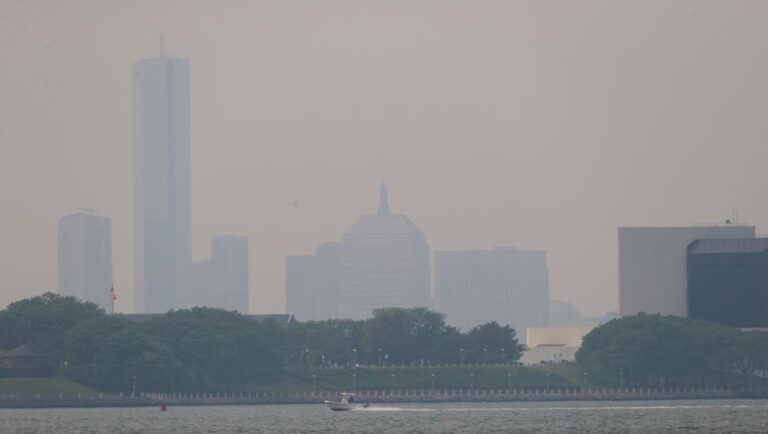The quality of air in coastal Massachusetts, New Hampshire, and Rhode Island has deteriorated in recent years, most likely due to wildfire smoke and extreme heat, an analysis of air quality data shows.
Both wildfires and extreme heat are becoming more intense due to climate change.
The annual report by the American Lung Association grades air quality in counties in the US based on ozone, commonly known as smog, and particulate pollution data. Particulate pollution is very fine matter, such as soot, that typically comes from wildfires, power plants, and industrial sources.
The Boston, Worcester, and Providence metro area averaged more high ozone days and more particulate pollution between 2021 and 2023 than between 2020 and 2022.
No county in Massachusetts received an “A’’ grade from the Lung Association’s report. Among the worst areas were Berkshire, Franklin, and Hampden counties, which all received “D’’ grades for particle pollution; and Bristol and Norfolk counties, which received “D’’ grades for ozone pollution.
Worcester County earned a “C’’ grade on particle pollution, down from a “B’’ last year.
The slipping air quality is part of a national trend: The annual report by the American Lung Association found that 156 million people in the US, or about 46 percent of the population, now breathe unhealthy levels of air pollution, an increase of 25 million from 2020-2022.
“Families across the US are dealing with the health impacts of pollution every day, and extreme heat and wildfires are making it worse,’’ said Harold Wimmer, president and CEO of the American Lung Association, in a statement.
Air pollution can cause asthma attacks, premature death, heart attacks, strokes, preterm births, and impaired cognitive functioning, according to the American Lung Association. Particle pollution can also cause lung cancer.
The impacts of the pollution are disproportionately felt. Nationally, people of color are more than twice as likely as white residents to live in a community with poor air quality, the report found.
Climate change is playing a role in the worsening air quality. Hot temperatures accelerate reactions between volatile organic compounds and nitrogen oxides to form ground-level ozone, or smog. As the planet warms, those hot and stagnant days are becoming more common.
At the same time, droughts, which are made worse by higher temperatures that increase water evaporation rates, are also getting more extreme on a warming planet, increasing the size of wildfires when they occur.
Typically, New England and other Eastern states have better air quality than Western regions of the US. No New England city ranked on the list of the top 25 most polluted cities. The top three most polluted for ozone were all in California: Los Angeles, Visalia, and Bakersfield.
However, smoke from wildfires in Canada in 2023 drove levels of ozone and particle pollution in eastern states higher than they have been in several years.
“Right now, it’s certainly not the best, but it’s not near the worst,’’ said Mike Seilback, an assistant vice president for the American Lung Association, of the air quality in New England.
There were still some bright spots. Pollution levels in Suffolk County, which includes Boston, were slightly improved compared to last year’s report. (The Lung Association gave Suffolk County a “C’’ grade for ozone pollution and a “B’’ grade for particle pollution.)
At the same time that the nation’s air quality appears to be on the decline, the Trump administration is aiming to cut the EPA’s spending by more than half and plans to roll back some Biden-era air quality regulations, including on tailpipe emissions.
EPA Administrator Lee Zeldin has promised to protect the nation’s air and water quality amid those deregulatory actions. On Tuesday, which was Earth Day, Zeldin said in a statement that the EPA would “energize’’ the economy while remaining “committed to clean air, land, and water for all Americans.’’
However, the EPA’s new cost-cutting focus is concerning for experts at the Lung Association.
“This is not a time for the federal government to defund and destaff the EPA,’’ Seilback said. “It’s not a time to roll back the very impactful laws and regulations that are currently on the books to protect air.’’
Erin Douglas can be reached at erin.douglas@globe.com. Follow her @erinmdouglas23.
